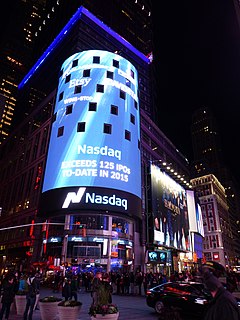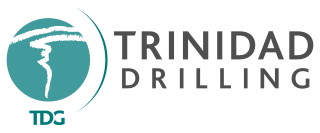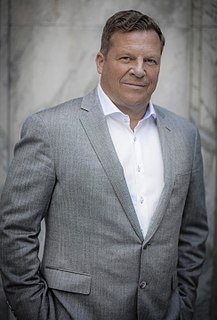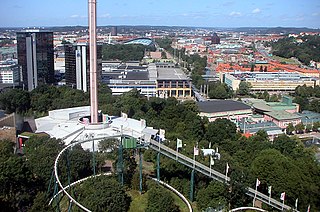
Bank One Corporation was the sixth-largest bank in the United States. It traded on the New York Stock Exchange under the stock symbol ONE. The company merged with JPMorgan Chase & Co. on July 1, 2004. The company had its headquarters in the Bank One Plaza in the Chicago Loop in Chicago, Illinois, now the headquarters of Chase's retail banking division.

Sandvik AB is a Swedish multinational engineering company specializing in metal cutting, digital and additive manufacturing, mining and construction, stainless and special steel alloys, and industrial heating. The company was founded in Sweden in 1862. In 2020, the Sandvik Group had approximately 37,000 employees and revenues of about 86 billion SEK in more than 160 countries. Europe accounted for 35% of its sales, followed by North America (22%), Asia (20%), Africa/Middle East (9%), Australia (9%) and South America (5%).
Jonathan Bryan Guinness, 3rd Baron Moyne is a British peer and businessman. A member of the Guinness family, he is the elder of the two sons of Bryan Guinness, 2nd Baron Moyne and his first wife Diana Mitford, and until his retirement was a merchant banker for Messrs Leopold Joseph.

Nasdaq, Inc. is an American multinational financial services corporation that owns and operates three stock exchanges in the United States: the namesake Nasdaq stock exchange, the Philadelphia Stock Exchange, and the Boston Stock Exchange, and seven European stock exchanges: Nasdaq Copenhagen, Nasdaq Helsinki, Nasdaq Iceland, Nasdaq Riga, Nasdaq Stockholm, Nasdaq Tallinn, and Nasdaq Vilnius. It is headquartered in New York City, and its president and chief executive officer is Adena Friedman.

Stockholms Enskilda Bank, sometimes called Enskilda banken or SEB, was a Swedish bank, founded in 1856 by André Oscar Wallenberg as Stockholm's first private bank. In 1857, Stockholms Enskilda Bank began to employ women, claiming to be the first bank to do.
The Guinness share-trading fraud was a major business scandal of the 1980s. It involved the manipulation of the London stock market to inflate the price of Guinness shares to thereby assist Guinness's £4 billion takeover bid for the Scottish drinks company Distillers. Four businessmen were convicted of criminal offences for taking part in the manipulation. The scandal was discovered in testimony given by the US stock trader Ivan Boesky as part of a plea bargain. Ernest Saunders, Gerald Ronson, Jack Lyons and Anthony Parnes, the so-called Guinness four, were charged, paid large fines and, with the exception of Lyons, who was suffering from ill health, served prison sentences. The case was brought by the Serious Fraud Office.

Carnegie Investment Bank AB is a Swedish financial services group with activities in securities brokerage, investment banking and private banking.

Trinidad Drilling Ltd. was a corporation headquartered in Calgary, Alberta, Canada that operated in the drilling and well servicing sectors of the North American oil and gas industry. Trinidad was acquired by Ensign Energy Services between late 2018 to early 2019, and was amalgamated into Ensign in 2019.
Kreuger & Toll was a company founded on May 18, 1908 by two Swedish engineers, Ivar Kreuger and Paul Toll, with Henrik Kreüger working as a consultant and chief engineer.

Kindred Group is an online gambling operator which consists of 9 brands, among them Unibet, Maria Casino and 32Red. The Group offer products such as online casino, online poker, online bingo, and sports betting. The company is registered in Malta, but also has major hub offices in Gibraltar, London, Stockholm and the US in addition to smaller satellite offices across Europe and Australia. Kindred Group is a publicly listed company on the Stockholm Stock Exchange (Nasdaq). In 2017, the company's revenue was GBP 751.4 million.
Klarna Bank AB, commonly referred to as Klarna, is a Swedish fintech company that provides online financial services such as payments for online storefronts and direct payments along with post-purchase payments.

Trust Me is a 2010 Swedish comedy-drama film written and directed by Johan Kling, starring an ensemble cast including Alexander Skarsgård, Gustaf Skarsgård and Susanne Thorson. The screenplay focuses on a group of young people who are running a small theater in Stockholm.
American Fletcher National Bank was an Indianapolis-based bank founded in 1839 that was eventually absorbed by Bank One and later Chase Bank. Since the merger of the Fletcher Trust Company with the American National Bank to form the American Fletcher National Bank and Trust Company at the end of 1954, it had been the largest or the second largest bank in the state of Indiana, often changing places with its Indianapolis-based rival Indiana National Bank for the top spot. From the mid-1950s through the late 1980s, American Fletcher National Bank and Trust, along with Indiana National Bank and Merchants National Bank, was one of the top three largest banks within Indianapolis and its holding company, American Fletcher Corporation, was one of the top three largest bank holding companies within the state, along with INB Financial Corporation and Merchants National Corporation.

Christen Eugen Ager-Hanssen is a Norwegian internet entrepreneur & venture capitalist. Since the late 1990s, he has been based in London and is a highly controversial private equity professional. Ager-Hanssen was involved in several high-profile M&A deals and has become known for public hostile takeovers. In a Canadian Business cover story, he was described as both Gordon Gekko and a modern-day Viking. In 1999 he became one of Norway's richest citizens. He was reported to be worth over $2.5 billion in 2005.
Hoist Finance is a Swedish financial services company. Hoist Finance is active in eleven European countries, and specializes in the acquisition and management of non-performing consumer loans. Hoist Finance manages approximately 4 million receivables with a total aggregate face value of approximately EUR 9.5 billion and gross collections amounted to EUR 730 million in 2014. Hoist was previously listed on the Stockholm Stock Exchange but was de-listed in 2004. In 2003, the company divested its operations in non-performing consumer loans in Sweden but has since 2009 offered deposit accounts in Sweden (HoistSpar) and now has a total deposit base of SEK 8 billion. In 2012, Hoist Finance was one of the largest acquirers of non-performing consumer loans in Europe with an acquisition volume of approximately SEK 2 billion, one significant acquisition being the acquisition of the UK debt-collection agency Robinson Way Ltd. In October 2013, Hoist listed a 10-year bond for SEK 350 million on Nasdaq OMX Stockholm. A 3-year bond for SEK 750 million was listed by Hoist on Nasdaq OMX Stockholm in January 2014.
Aspiro AB is a Norwegian-based and legally Swedish-domiciled technology company founded in 1998. The company mainly provides subscription-based lossless music streaming services under its two brands, Tidal and WiMP. The company is headquartered in Norway, with additional offices in Poland, Sweden, Denmark, and Germany.

Kone- ja Siltarakennus Oy is a Finnish former engineering company based in Sörnäinen, Helsinki.
Joachim Ralph Posener, is a Swedish financier and author. Posener is a lawyer by educated who was active in the Swedish finance trade from the late 1980s to the end of the 1990s. He became publicly known in November 1997 after having been accused by the media as being the mastermind behind Lord Moynes acquisition of the Swedish publicly traded company Trustor AB. The company acquisition, which later become known as the Trustor affair eventually ended with one of Lord Moynes "Team" members, Thomas Jisander, being sent to a prison term. When Swedish police acted against Lord Moyne and his "team" in October 1997 Posener happened to be abroad, and he chose then according to his own statements to not return to Sweden. This became very well publicized in Swedish media and also led to Posener being hand down an international arrest warrant. According to his own statements he was at first for some time in Spain, and later he is supposed to have lived in Argentina. In spite of the International Arrest Warrant Posener was never found by the police and the crimes the police had suspected him of were no longer actionable against Mr Posener due to the Swedish law on statute of limitations. No one of Lord Moynes "team" could be accused in any court of law with regard to the Trustor Affair after the 20 June 2007.
John Filip Tysander is a Swedish businessman and entrepreneur who founded the watch brand Daniel Wellington in 2011.

Fingerprint Cards is a Swedish biometrics company that develops and produces biometric systems. Fingerprint Cards was founded in 1997 by Lennart Carlson.










